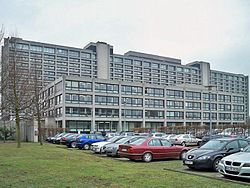Socialist Workers' Party (Liothidia)
 | |
| First Secretary | Georg von Carstein |
| Vice Secretary | Teresa Fehrenbach |
| Founded | 1 May 1908 |
| Headquarters | 12. August Platz, Rahden |
| Student wing | Socialist Students of the Revolution |
| Youth wing | Free Socialist Youth |
| Research wing | Central Party Policy Office |
| Armed wing | People's Revolutionary Army |
| Membership (2017) | |
| Ideology | Popular Socialism Liothidian nationalism |
| Position | Far-left |
| Colours | Red |
| Slogan | Für das Volk ("For the People") |
| Seats in the People's and Workers' Assembly | 475 / 680
|
| Seats in the Central Committee | 27 / 30
|
| Party flag | |
 | |
The Socialist Workers' Party (Liothidian: Sozialistische Arbeiterpartei, SAP), is the founding and ruling political party of the Liothidian Democratic People's Republic. The Socialist Workers' Party is the sole governing party within Liothidia, permitting only highly vetted and subordinated independents to co-exist within the national legislature. It was founded in 1908, chiefly by Heinrich Schrader and Gustav Hohenstein. The party grew quickly, and by 1918 had overthrown the Hechenreyt monarchy and established the People's Democratic Republic. It also controls one of the world's largest armed forces, the People's Revolutionary Army.
The SWP is officially organised on the basis of democratic centralism, a principle conceived by Liothidian Wernerist theoretician Heinrich Schrader which entails democratic and open discussion on policy on the condition of unity in upholding the agreed upon policies. Unlike other socialist governing parties, the SWP abolished the alternating bodies of preeminence and installed a fixed structure in 1977. As such the highest body of the SWP is the Central Committee of State, which also forms the nominal executive of Liothidia, while the Central Committee holds all duties and responsibilities of the party.
The party's leader holds the offices of First Secretary (responsible for civilian party duties and head of state) and Secretary of the Revolutionary Defence Commission (responsible for military affairs). Through these posts, the party leader is the country's paramount leader. The current paramount leader is Georg von Carstein, elected at the 10th General Party Congress held in May 2015.
The SWP is committed to communism and continues to participate in the XXXX each year. According to the party constitution, the SWP adheres to Wernerism–Schraderism, Three Pillars of Advancement, Socialist Virtues of the Fatherland, Popular Socialism and Socialism in Modernity. The official explanation for Liothidia's economic reforms is that the country is in the primary stage of socialism, a developmental stage similar to the capitalist mode of production. The command economy established from 1918 until 1970 was replaced by the socialist market economy, the current economic system, comes under Popular Socialism.
History
Governance
Organisation
Central organisation
Lower-level organisations
Members
To join the party, an applicant must be approved by the party, usually through the District Party Administrative Office, the regional level branch of the party apparatus. In 2017, only 1.3 million applications were accepted out of some 4 million applicants. Admitted members then spend a year as a probationary member.
In contrast to the past, when emphasis was placed on the applicants' ideological criteria, the current SWP stresses technical and educational qualifications. To become a probationary member, the applicant must take an admission oath before the party flag and state flag. The relevant SWP organization is responsible for observing and educating probationary members.
Probationary members have duties similar to those of full members, with the exception that they may not vote in party elections nor stand for election. Many join the SWP through the Free Socialist Youth, a significant number join through service in the People's Revolutionary Army, where military service has party membership a mandatory policy. Under Manfred von Weizsäcker, private entrepreneurs were allowed to become party members in 1991. Membership is also mandatory for all employees of state-owned enterprises, judicial workers, academics and law enforcement.
According to the SWP constitution, a member, in short, must follow orders, be disciplined, uphold unity, serve the Party and the people, and promote the socialist way of life. Members enjoy the privilege of attending Party meetings, reading relevant Party documents, receiving Party education, participating in Party discussions through the Party's newspapers and journals, making suggestions and proposal, making "well-grounded criticism of any Party organization or member at Party meetings" (even of the central party leadership), voting and standing for election, and of opposing and criticizing Party resolutions ("provided that they resolutely carry out the resolution or policy while it is in force"); and they have the ability "to put forward any request, appeal, or complaint to higher Party organizations, even up to the Central Committee of State, and ask the organizations concerned for a responsible reply." No party organization, including the SWP central leadership, can deprive a member of these rights.
As of 30 June 2016, individuals who identify as farmers and fishermen make up 2.6 million members; members identifying as workers totaled 10.2 million. Another group, the "Managing, professional and technical staff in enterprises and public institutions", made up 8.5 million, while 7.05 million identify as either active or retired military personnel. 10.3 million women are SWP members. With 28.35 million members, it is the largest political party in Belisaria and one of the largest in the world.
Free Socialist Youth
Support organisations
Central Party Office for Solidarity
The Central Party Office for Solidarity is one of the oldest continuing support-units of the SAP. Established in November 1919, it was initially tasked with assisting socialist and communist parties across Belisaria in amassing support, influence and ultimately power.
Central Party Policy Office
Central Party Office for Women's Rights
The Central Party Office for Women's Rights (Zentrales Parteiamt für Frauenrechte; ZEPFR) is the primary body within the party dedicated to "ensuring continued gender equality, female rights and liberties." It was established in 1929 by Magda Kessler, the wife of the then First Secretary Reinhardt Kessler. ZEPFR succeeded the Women's Socialist Party, a sister-party to the SWP.
Throughout the 1930s, ZEPFR was the primary source for the radical equality laws implemented during the decade. Many of its earliest successes included equal property rights, equal employment rights and the lifting of the ban on women in the military, though in 1944 this was re-implemented in exception for support roles.
In the post-war period ZEPFR was focused on women's health, both physical and mental and expanded to cover support for women victims of domestic abuse, drug abuse and alcoholism. In 1957, it established the Single Mothers Commune, a local-level social club for single mothers, who receive advice, support and financial assistance. In 1982, ZEPFR formed the Red Mothers' Sanctuary Scheme, which established a series of state-owned and funded safe houses for victims of domestic abuse.
Central Party Office for Business and Industry
The Central Party Office for Business and Industry (Zentrales Parteiamt für Wirtschaft und Industrie; ZEPWIN) is the party's official body dedicated to consulting with major private businesses over economic and fiscal policy. While many mistake ZEPWIN as the primary party body for dealing with state-owned enterprises, in truth ZEPWIN has been described as the "formal platform for corporate interests within the party-government."
ZEPWIN meets weekly with delegates from the United Congress for Commercial Affairs (VKKA), the nation's chamber of commerce, at these weekly meetings, the delegates will discuss economic trends, market movements and general desires for reform or policy. During these meetings, it is widely accepted that the government is also to express desires and aims to delegates.
During times of economic difficulty, ZEPWIN mediates between the VKKA, the Volksbank, Finance and Industry ministries to formulate systemic policies and responses. These instances and the day-to-day work of ZEPWIN lacks significant transparency and its activities are not explained nor described to the Volksversammlung or any legislative body. Due to this lack of transparency, ZEPWIN has been derided as the as the official means for corporate interests to both be explained and forced upon central government.
People's Administration for Religious Affairs
The People's Administration for Religious Affairs (Volksverwaltung für religiöse Angelegenheiten; VORAN) is the official state and party body tasked with administrating the government's relationship with Liothidia's religious bodies and minorities. Established in 1924 as a means of controlling religious, primarily Fabrian Catholic influence within the new socialist state, it has since evolved into one of the largest state bodies.

VORAN first emerged as a means of maintaining state control and repression following the Überholung (1918-1920) which purged thousands of clergy members from numerous denominations present in Liothidia. The acceptance of religion's role within Liothidian society in wake of the revolution, led to the government seeking means of managing Church influence, while simultaneously aiming to corral the Church into propagating teachings beneficial or supportive of the party.
During the late 1920s and 1930s, VORAN implemented the National Program for Integration of Socialism and Faith, which saw state surveillance of seminaries, places of worship and the residences of religious figures. The same time, VORAN issued strict guidelines and regulations in the training of priests to ensure their "continued and unquestionable support and contribution to the Revolution." The body was aided by the lack of support for state atheism within the party from its founding onward, while many party elites saw religion as another means of "uniting the proletariat", others saw religion as a "inadmissible fact of Liothidian life."
Throughout the Second Lio-Vannoisian War, VORAN worked closely with Church officials to raise morale and maintain the war effort on the home front. Following the war, the Catholic Church's influence and standing among party elites increased and repressive policies were relaxed. However, VORAN's extensive network of informants within the Liothidian Church and its close cooperation with KOMINSI has enabled the body to maintain a tight grip on the Liothidian clergy since.
Other aspects of VORAN's remit include the managing of joint state-church charitable ventures, the funding of Church services for the poor and vulnerable and the maintenance of Church property and assets.
